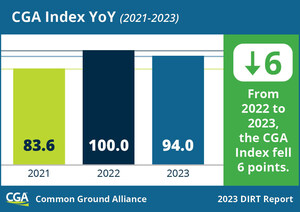Common Ground Alliance's 2015 DIRT Report Estimates that Damages to Buried Utilities Dropped 9 Percent from Previous Year
Record number of submissions, new methodology to merge multiple reports of same event, and new interactive dashboard make the 2015 DIRT Report the most comprehensive examination of damages to underground infrastructure to-date
WASHINGTON, Oct. 4, 2016 /PRNewswire/ -- Common Ground Alliance (CGA), the stakeholder-run organization dedicated to protecting underground utility lines and the people who dig near them, today announced findings from its comprehensive 2015 Damage Information Reporting Tool (DIRT) Report.
The report, which is the sum of all 2015 data submitted anonymously and voluntarily by facility operators, utility locating companies, one call centers, contractors and regulators, estimates that the total number of underground excavation damages in the U.S. last year dropped by 9 percent from the year prior, to approximately 317,000 damages. The 2015 damage ratio, which measures damages per 1,000 one-call transmissions, decreased by nearly 4 percent from 2014. Combined with an 8 percent increase in locate requests, a 15 percent increase in housing permit activity and a 4 percent increase in construction spending on infrastructure, the 2015 DIRT Report shows that damages are decreasing as construction activity increases and as awareness of the free 811 service increases.
For the first time, the 2015 Report matched and weighted multiple data submissions pertaining to the same event, which are often submitted by two or more stakeholders. This new methodology, along with a record number of event submissions (more than 363,000), and a higher Data Quality Index score (a measurement of the completeness of data submissions) than either 2014 or 2013, makes the 2015 DIRT Report the most comprehensive and accurate account of the state of damages to underground infrastructure ever compiled.
"The expanded methodology of the 2015 DIRT Report represents a new benchmark in damage prevention. The volume and quality of DIRT data increases every year, strengthening the insights we glean from the report – and the data science points to our 2015 analysis being the most comprehensive picture of how and why damages occur across the country," said Bob Kipp, CGA President. "For the first time ever, damage prevention stakeholders will also be able to use the data analysis and visualization platform Tableau to examine the DIRT data sets most relevant to their type of work, location, root cause, or other variables."
The interactive 2015 DIRT Dashboard, powered by Tableau, is accessible to the public through the CGA website. It contains seven individual dashboards that examine 2015 data through the lens of a specific element, e.g., damage characteristics by state, root cause analysis, etc. Each dashboard visualization allows users to sort information through additional filters, giving damage prevention stakeholders a powerful tool for drilling down into the topics that are most interesting to them or where they feel they can have the biggest positive impact.
While the new matching and weighting methodology represents a reset for DIRT data analysis in some important areas – including damage root causes, an area that the report flags for data quality improvement – the report's findings still emphasize the importance of targeting one call process education to occupant excavators (e.g., homeowners and farmers), to those who do landscaping and fencing work, and those who dig with hand tools. The 2015 DIRT Report also identified that educating professional excavators about safe digging practices could prevent a large percentage of damages to buried infrastructure.
"CGA's Data Reporting and Evaluation Committee has worked closely with data scientists to develop an even more refined and accurate approach to analysis of the 2015 DIRT dataset with the goal of providing damage prevention advocates with the best and most relevant information," said Bob Terjesen, Data Committee co-chair from National Grid. "Paired with the new interactive DIRT Dashboard hosted on the CGA website, this year's report puts unprecedented analysis tools at the fingertips of those who are committed to protecting underground utilities and the people who work near them."
The complete DIRT Annual Report for 2015 is available for download at http://www.commongroundalliance.com, and stakeholders interested in submitting data to the 2016 report or establishing a Virtual Private Dirt account should visit the DIRT site at www.cga-dirt.com.
About CGA
CGA is a member-driven association of nearly 1,700 individuals, organizations and sponsors in every facet of the underground utility industry. Established in 2000, CGA is committed to saving lives and preventing damage to North American underground infrastructure by promoting effective damage prevention practices. CGA has established itself as the leading organization in an effort to reduce damages to underground facilities in North America through shared responsibility among all stakeholders. For more information, visit CGA on the web at http://www.commongroundalliance.com.
Media Contact:
Khrysanne Kerr
571-385-2606
Email
SOURCE Common Ground Alliance
Related Links
WANT YOUR COMPANY'S NEWS FEATURED ON PRNEWSWIRE.COM?
Newsrooms &
Influencers
Digital Media
Outlets
Journalists
Opted In




Share this article